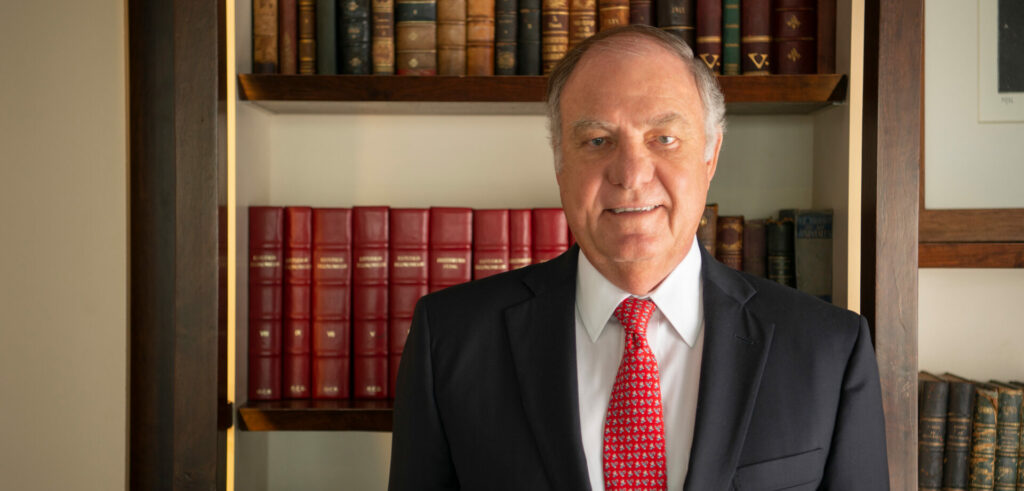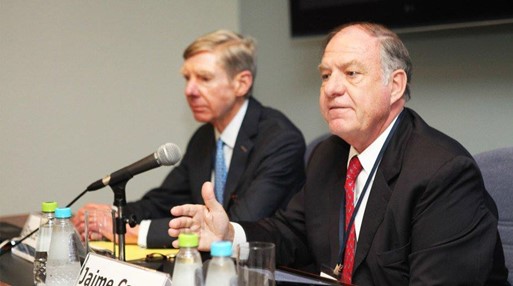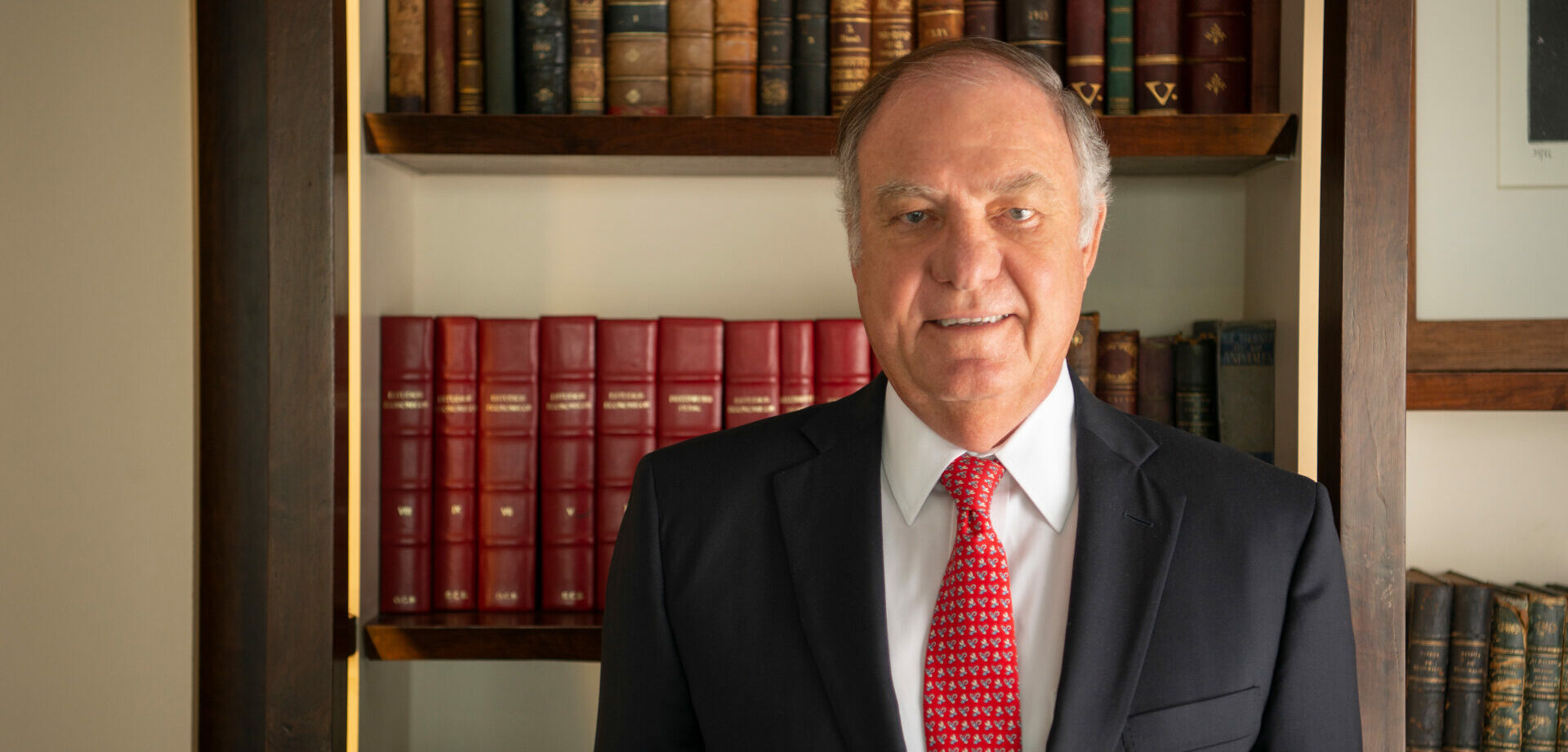Jaime Carey’s ability to break new ground and cultivate long-lasting tradition in equal measure is what makes him stand out from the crowd. We interview a man who knows the value of applying a business savvy approach to law firm management, while never losing sight of what he believes truly matters.
If he had not pursued a legal career, Jaime Carey might have ended up allowing his young, entrepreneurial spirit as an insurance broker to take off. But the insurance sector’s loss has undoubtedly been the legal market’s gain. He has decisively shaped the path of the law firm that shares his name: Carey, one of Latin America’s most successful law firms and Chile’s largest. It stands firmly in the regional legal market’s elite.
His eye for business dates back to those late teenage years as an entrepreneur. After studying law and business administration at Spain’s ICADE and the University of Deusto between 1972 and 1975, Jaime returned to Santiago to undertake a law degree at the Pontifical Catholic University of Chile, during which time he also obtained a local qualification to be an insurance broker. While still studying, he worked freelance as a broker and was paid commission – thriving on the “innovating and entrepreneurial spirit” the role cultivated. “That is my earliest experience of forming a little company,” he says.
He eventually had to decide between pursuing insurance or law, choosing the latter but never forgetting the early days of his working life and the lessons he learned. “Forming a small brokerage company gave me the perspective of having to be independent while also having to deal with clients,” he says. “Selling insurance and different services is a very client-facing role, which was very useful for then working in a law firm and having to deal with clients.”
Professional experience
- Partner at Carey since 1986
- Managing partner at Carey since 2000
- Chairman at the World Services Group from 2004 to 2005
- Chair of the legal practice division of the International Bar Association from 2017 to 2018
- Board member of Sencorp, Banmédica (UnitedHealth Group) and Evercrisp (Frito Lay Chile); and chairman of the board of MetLife Chile
Practice areas
- Tax law
- M&A
- Family companies and holdings
In at the deep end
After returning to Chile in 1979 – following a period spent working as a foreign associate at Miami law firm Steel, Hector & Davis – Jaime recalls finding himself thrown in at the deep end. He joined his grandfather’s firm, which was then called Carey y Cía. The firm had been established in 1905 and covered several key transactional and non-transactional practice areas, including M&A; banking and finance; construction; labour; and tax. When he joined the firm, there were just six lawyers working there, all of them as generalists.
Rolling up your sleeves and getting stuck in was part of the fun; it was an education. “People tended to be more generous back then with the areas they covered [and] you had to be good at pretty much everything,” he remembers. “I had to learn very quickly and be prepared to participate in many transactions across a wide range of practice areas.”
He became partner in 1986. It was his first brush with law firm management and he began replicating his own “education” for the benefit of his associates, believing it was important that they too experienced the deep end early on in their careers. “I had to cope with very complex transactions at a very young age, when my experience and knowledge were limited,” he says. “You couldn’t make a fool of yourself. You had the reputation of the firm at stake and you had to ensure clients were always satisfied. This is what I like all associates at the firm to experience too, as it is the best and fastest way to learn.”

At the same time as he became partner in the late 1980s, Chile’s emerging economy was starting to experience a boom in foreign investment. This fuelled an unprecedented appetite for local firms from international banks and companies. Carey stood out from the crowd because it had bilingual lawyers with experience working and studying abroad. “We had experience of how New York and London firms operated, and what international clients expected,” he says.
“This gave us a good competitive advantage to grow with international clients.” This has remained one of the firm’s defining features to this day; most of the associates have worked and studied abroad, and everyone speaks at least two languages. Soon after being made partner – when he was just 30 years old – one of his clients, US explosives company Austin Powder, made Jaime a board member. He was asked to help guide the company through its regional expansion. He became close with the CEO, acting as his trusted adviser and being present throughout the planning and execution of the company’s expansion. He says that this “unforgettable” experience helped give his firm visibility throughout the continent. Back then the Chilean legal market was smaller than it is today, and most firms were orientated towards local clients. Very few firms took an international approach, whereas Carey was trying to break new ground.
His experience at Austin Powder also opened his eyes to the ways a manager can help their business grow. “Being there through the company’s expansion heightened my awareness for what’s important for business growth – namely being hands-on and holistic about issues,” he says.
During his early years as a partner, Jaime helped drive his firm’s expansion plans. “We needed to grow, and to grow you need to invest,” he explains. But rather than just simply investing in what the market already had to offer, he steered his firm to develop its own technologies, which it employed to improve internal systems –including for security, marketing and remuneration – as well as client services. He did so because he believes homegrown applications are a better fit. “Developing your own technologies forces you to get involved in the business of the firm,” he explains. “The high price of US-developed technologies in the 1980s and 1990s was far too expensive; we were forced to invest and develop our own technologies or buy those that were well proven to be popular with international firms. I had the conviction and knew we had to invest in
this area; I was always looking to the future.”
What’s in a name? The story behind the name change
Carey y Cía changed its name to Carey in 2010. “So many international clients didn’t realise that ‘Cía’ is short for ‘company’ in Spanish,” says Carey. “They would ask, ‘who is Mr Cia?’ while some would even ask if we had any connection to the CIA. At the
beginning of the last decade we felt it was time to simplify the name, which worked out well considering the general trend nowadays to use shorter, snappier names.”
Eye for institutionalisation
Jaime became partner when the firm was moving towards greater institutionalisation. In the early 1990s he was supportive of an unprecedented decision by his brother Jorge Carey – then managing partner – to move the firm away from a family-run structure to one that was more equitable and would allow talented younger partners into the fold. Along with the partnership at the time, Jaime committed to levelling the playing field for all partners, who were given equal participation in the firm’s equity and a modified lock step compensation system was introduced.
From that point on, career progression at Carey hinged solely on professional merit. It was a real turning point – not just for the firm, but for the wider legal market in Latin America too, because back then no other firm had attempted to do something like that. Carey is recognised as one of the first Latin American firms to institutionalise. “We became a firm that truly based legal careers on merit,” he reflects.
The “one partner, one vote” rule allowed partners greater flexibility. They felt their voices were heard and respected. “It is so much better than a centralised structure that makes the majority miserable,” he says. “I like that people feel happy when they come to the office. I’ve always wanted them to feel like owners of their own work.”
Since being elected Carey’s managing partner in 2000, Jaime has taken further steps towards greater institutionalisation of the firm. Seeing that it was difficult for young partners to pay the substantial dues that partners were expected to hand over to become equity partners, he pushed for the firm to do away with this requirement in the early 2000s. Partners no longer have to pay anything when they join the partnership, nor do they receive anything when they leave. It was a monumental decision for the firm, and he is proudest of this “nothing in, nothing out” system he introduced. “It was very rare in those days and, even today, this democratic way is uncommon in the Chilean market.”
If eat-what-you-kill is in one camp, Carey stands firmly in the other camp by following a modified lockstep model. Jaime has found maintaining a culture of non-competition among partners his greatest challenge as managing partner, but one he has revelled in. “I always say it’s like the three musketeers – all for one, one for all,” he says. “I have constantly pushed lawyers to make the pie grow so it’s bigger for us all. It should never be about individuals getting a bigger slice of the pie just for themselves.”
Jaime has always been able to recognise the business potential generated by institutionalisation. At the firm partner compensation is not dictated by practice area, something he says has helped generate a real sense of ownership from every partner, as well as a culture of collaboration. “There will always be difficulties explaining to young partners that this is a medium- and long-term business, and you can’t look at things from month to month,” he says. “But soon they see that this approach does pay off. We don’t run away with the ball; we play as a team. And when you do that, you see it in the returns – both in the profits and in the environment where you work.”
Over the years, Carey the firm has become an undisputed titan that is highly regarded as being excellent across many practice areas.
Jaime has prioritised cultivating specialised groups that operate like boutiques. “The good thing about this structure is that lawyers have access to the bigger picture. From our inception until now, and as they will continue to do so, clients appreciate the broad scope and perspective our lawyers bring to solving their problems.”

People are your priority
In an industry where egos can dominate, Jaime’s refreshingly considerate attitude has shone during his career. “I think I’ve always been perceived as being practical and creative,” he muses. “Humour is important too – it can help smooth rough edges.”
His vision has always been to lead the firm towards collegiality and good relations both externally and internally. A good leader does not prioritise the bottom line above all else, Jaime explains: “Money and profits, in a way, come secondarily; strangely, when other factors are your focus – maintaining a pleasant place to work, ensuring trust and collaboration among lawyers – the money has a way of following.”
A law firm would be nothing without its people and talent. So, when crisis strikes – as it did rather unexpectedly in Chile last October, with extensive protests about social and economic inequality – firms in any jurisdiction could take inspiration from the way Carey’s managing partner mitigated the damage. He organised psychologists to come to the firm to reassure all those concerned about the uncertainty and granted total flexibility for staff and lawyers to work from home. For those who did brave commuting to the office, transport to and from work was arranged to ensure their safety. Your people are your priority, Jaime emphasises. “Worry about your people, they are your talent. In a crisis, be willing to reduce profits to help workers maintain their jobs – they are needed for investment,” he says. “A law firm is a long-term business; to think you can deal with all its issues in the short-term alone won’t work.”
He has held the position of managing partner for two decades, affording his firm a great deal of stability. It is testament to his popularity that he has been voted managing partner by his partners time and time again when the secret vote is cast every six years.
An eventual change in leadership will represent a test for the firm, but Carey has put in place structures designed to prepare leaders of the future. There is an executive committee that all partners can put themselves forward for in a secret vote that takes place every 30 months, as well as other permanent committees focused on areas such as communications, hiring, associate compensation, pricing and billing.
In the 20 years Jaime has been managing partner, only three partners have left the firm (and two more have retired) – a low number that can be considered evidence that this really is a very tight-knit, committed group of partners capable of holding strong.
Three leaders Jaime Carey admires from history
- Mother Teresa
“She represents kindness, generosity and devotion. She gave her life to help the poorest and the neediest, putting them before her, which is something I have always admired very much.” - Sir Winston Churchill
“He was a fabulous statesman and he was able to inspire the British people to defend Britain against all odds and finally win the war. He had a superb wit to deal with all situations.” - Ronald Reagan
“He was a totally self-made man, who was able to become president of the USA. He had the virtue to admit his limitations and to name very qualified people to whom he could delegate, and the virtue to finally recognise and accept his Alzheimer’s.”
The next chapter
Alongside his managing partner responsibilities, over the years Jaime has devoted much time to the International Bar Association (IBA). He has been attending IBA events for 36 years and has played roles on several of its committees. Most prominently, he completed a term as chair of the Legal Practice Division in 2018, holding the position for two years. He’s now running to be secretary general of the IBA, with a goal to eventually becoming its president.
Such an achievement would be recognition of the broad support he elicits from his peers in the region. Nicolás Herrera, partner at Uruguayan firm Guyer & Regules, notes, “There are very few leaders of Latin American firms of his calibre, depth and talent; he’s an example to follow and a guide for future generations. His vision for the future of his firm and how to grow and succeed have been impressive.”
Praise for Jaime’s leadership, both at his firm and within the IBA, comes from other sources too. Luis Carlos Rodrigo Prado, partner at Peruvian firm Rodrigo, Elias & Medrano Abogados, has worked with him on transactions “where he is driven and strategic” as well as at the IBA and other organisations, and states: “He has a wonderful sensitivity with people and a naturally magnetic personality. He’s an exceptional person … a true leader who is also humble and very funny; he’s a truly unique individual.”
Jaime has come a long way since his days as a teenager selling insurance. Latin Lawyer’s Law Firm Leader of the Year award reflects the resilience and drive he has maintained throughout his impressive 40-years-and-counting career. He admits that he “cringes” when forced to talk about himself, but like any great leader he is someone worth listening to. In turn, he has always wanted to hear what others have to say. “Managing partners are CLOs – chief listening officers – and I think that’s the best advice I could give to any lawyer out there who wants to progress to a leadership position.”
